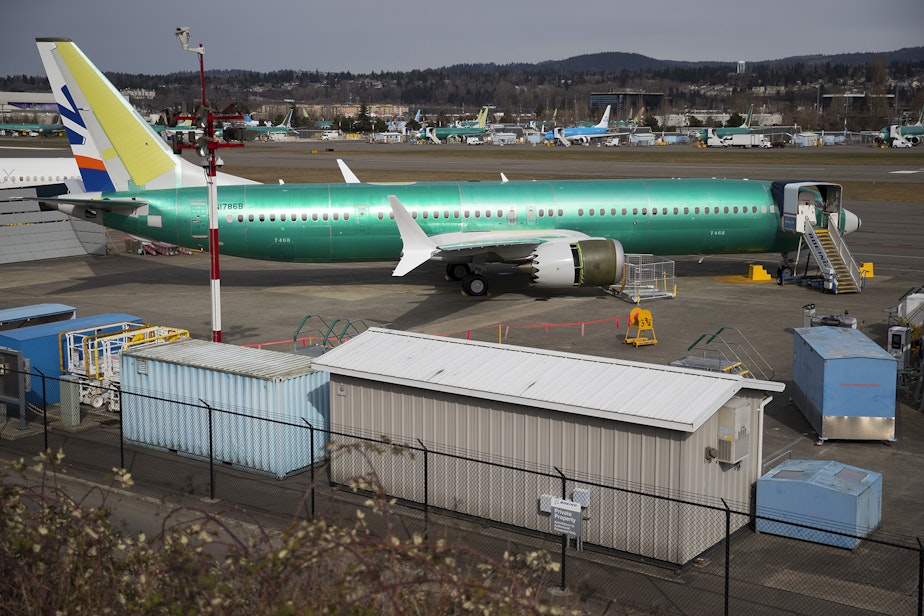Boeing’s latest troubles could mean sunset for the 737

It's the highest selling commercial airliner in history. But now the future of the 737 is in doubt.
The 737 MAX remains grounded around the world after two fatal crashes.
Now underlying problems with the 737 MAX are creating challenges that could affect other new Boeing planes — and bring about the end of Boeing's best-selling product of the 1960s.
KUOW reporter Carolyn Adolph talks with host Kim Malcolm about the future of the aircraft.
The following interview has been lightly edited for clarity.
Kim Malcolm: So what is the underlying problem with the 737 Max — is it the automated systems we've been hearing about?
Carolyn Adolph: It is, but at the root of that is the fact that the plane is so low to the ground. It started out back in the '60s designed for a stubby little regional jet, seating something like 50 people. And it was designed low to the ground so that baggage handlers could toss in suitcases by hand. Fast forward half a century: The latest model, the Max, now has huge engines that would have been low enough to take out the runway lights if Boeing hadn't changed the position of the wings. And that changed the center of gravity in the plane making the planes take its nose up when in flight. So the automated system called MCAS corrects that new natural tendency.
Malcolm: So this automated flight control system MCAS and the plane itself now are under close scrutiny. What does this mean for its future?
Adolph: Well, right now it's not encouraging. Boeing got 10 orders for the 737 Max in the first quarter of 2019, compared to 112 in the same quarter the previous year. And they got zero orders last month. But it's bigger than that. This whole crisis may be signaling the end, or the beginning of the end, for the 737 — you know, our domestic workhorse plane, the plane we've all flown in for decades.
Here's Michel Merluzeau. He's an aerospace analyst at a company called AIR.
Merluzeau: It is safe to say that the 737 is sunsetting to a degree. It's coming to the end of a 50-year-old career. You know it's going to fly for another 20, 25 years. But the design is no longer going to be, in my opinion, going to be able to cope with the requirements from regulatory bodies in the 2030s. Fundamentally, the 737 is not the plane of the future and I think we know that.
Malcolm: Not the plane of the future. So would that mean Boeing has to come up with a plane to replace the 737?
Adolph: Well, analysts like Merluzeau say it's inevitable. It would have to be a new design that would use the most fuel efficient engines and integrate all of the technology of our age. And right now some of that technology is there, but it's grafted on instead of being integrated. And it's possible Boeing would have to invest a lot of time and money into a complete new design. This is some time in the future.
Malcolm: Well, commercial aviation is such a highly competitive business. Airbus is lurking. China is developing its own commercial jets. How soon would Boeing have to try to make a new plane happen?
Adolph: That depends on how well Boeing can convince airlines and the flying public that the changes to the 737 Max make it safe. And that could buy it some time. It also depends on something that Boeing doesn't control, which is whether the Federal Aviation Administration is rehabilitated in the eyes of the world to air regulators. There are some nightmarish possibilities if that doesn't happen.
Malcolm: Like what?
Adolph: Well, let's say Boeing now has to get the 737 Max recertified by 20 national air regulators from around the world instead of just by the FAA because we, as we just heard, there's a lack of confidence in the FAA. So already that slows things down.
But what if politics enters the picture? Jon Ostrower is the editor in chief of the Air Current. His sources tell him about the possibilities that: "Whether a return to service of the Max or a 777X certification or other other projects around the world begin to be bargaining chips amongst politicians who are, who have a list of trade demands or something. And that's the risk here — that that we were seeing an unraveling of the certification world order that has been built up over the last several decades."
And I just want to point out we are nearing the time for Boeing to obtain airworthiness credentials for the 777X, which Boeing has been preparing, had been preparing to launch with fanfare just before this grounding happened. That plane is going to enter a world that was created by however the Max's problems are resolved.
Malcolm: Well, Carolyn if I was working for Boeing what should I make of this?
Adolph: Well, all of this has the potential to shift the business. I think that's why the unions have been so silent and it's been interesting. This week Scott Hamilton, who is another aerospace analyst, told KUOW he didn't think it was a good time for Boeing workers to make big purchases. That's the depth of the uncertainty right now.




